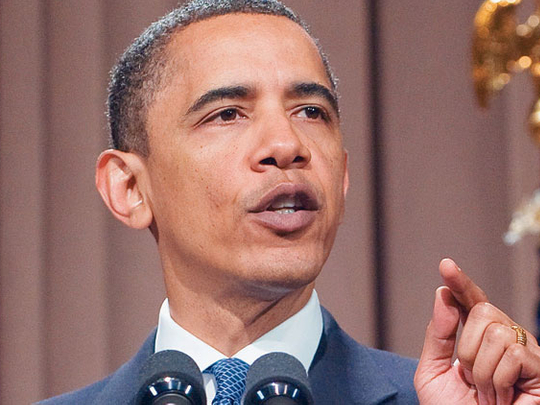
Washington: US President Barack Obama criticised Wall Street yesterday for risk-taking that led to the financial crisis and urged the banking industry to stop its "furious efforts" to block tighter regulation.
In a speech in New York attended by several Wall Street executives, Obama blamed the financial meltdown and the recession that followed on a "failure of responsibility" by both Washington and Wall Street.
He warned that the country faced a repeat of the crisis without new rules to rein in the financial industry in a speech that tapped into public fury at big banks and pushed a Democratic regulatory reform bill that is gaining traction in the US Senate.
"A free market was never meant to be a free licence to take whatever you can get, however you can get it," Obama said. "One of the most significant contributors to this recession was a financial crisis as dire as any we've known in generations," he added.
"And that crisis was born of a failure of responsibility — from Wall Street to Washington — that brought down many of the world's largest financial firms and nearly dragged our economy into a second Great Depression."
He said the legislation would significantly improve the current flawed regulatory structure, "despite the furious efforts of industry lobbyists" to try to weaken the proposals.
Perverse incentives
Obama, who has in the past referred to Wall Street executives as "fat cats", said some of the huge pay packages in the industry encouraged "perverse incentives to take reckless risks", although he added that he does not begrudge anyone success "when that success is earned".
Obama spoke at the historic Great Hall at Cooper Union college in Manhattan, the venue for several important addresses by leading Americans, including Abraham Lincoln who argued there against the expansion of slavery in a speech that helped assure his 1860 presidential victory.
Cooper Union was also the site of a speech Obama gave on financial reform during the 2008 presidential election campaign. Democrats hope cracking down on Wall Street will help them win voter support at congressional elections in November.
One of Obama's aims in the speech was to put pressure on Republicans to support reform legislation amid signs several in the opposition party may be willing to back the bill.
Goldman Sachs Chief Executive Lloyd Blankfein attended the speech along with Gary Cohn, the bank's president and chief operating officer.
Optimism
The White House has signalled increasing optimism about garnering Republican support to approve financial regulation legislation in Congress and is targeting moderate Republican senators, including Scott Brown of Massachusetts and Susan Collins and Olympia Snowe of Maine.
Several Republicans have taken aim in particular at the mechanism for winding down failing financial institutions, saying it would lead to perpetual bailouts of Wall Street. The White House says that is not true.
House of Representatives Republican leader John Boehner, in an opinion piece in Investors Business Daily, labelled the measure a "job-killing initiative" and said it "would provide the nation's largest financial firms with permanent bailouts".
He said Obama "talks a big game when it comes to Wall Street" but was promoting steps that "benefit the likes of Goldman Sachs".
Obama also wants to see a system for winding down large firms whose failure could disrupt markets, transparency for derivatives, strong consumer protections and a provision giving shareholders more say on executive pay.
Geithner Interview
No more bailouts
US Treasury Secretary Timothy Geithner yesterday dismissed claims by Republican opponents of financial reform that the Obama administration's proposals would mean more bank bailouts in future.
"It is nonsense," Geithner said in an interview on MSNBC television. "We will not support a bill that carries that risk."
He said reform proposal that Democrats are advocating would give the government power, should banks once again get into trouble, to "put them out of their misery" by winding them up.
Geithner said that it was vital to put in place a system whereby troubled financial firms can be put into bankruptcy. That wasn't possible when the 2008 financial crisis was raging and it handicapped the government's ability to deal with it.
"If you don't do that, then investors and executives will run their firms with the expectation that governments will come in and protect them from their mistakes in the future and that's not something we're prepared to allow," he added.
Geithner was questioned about the fact that the remaining big banks that survived the financial crisis are bigger than ever and potentially more at risk because of their size.
"They are big but we're going to limit their size and limit how much risk they can take," he said, noting that current law says no single bank can hold more than 10 per cent of the nation's total bank deposits.
"That's a good rule," he said. "It's not quite tough enough because if you fund yourself through other means… perhaps through the markets, you can get bigger than that so what we're suggesting is that we have an overall cap… to prevent the risk that they get too big."
— Reuters












